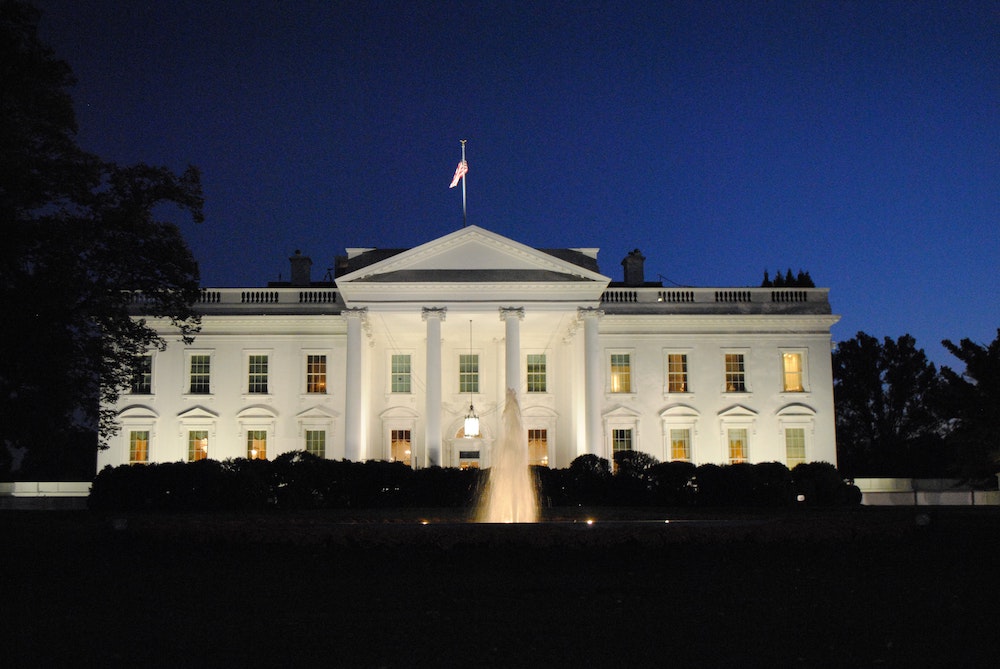
The White House, Washington, D.C. (Unsplash/Tabrez Syed)
By now the effects of COVID-19 have been well documented — from "safe at home" orders, to the temporary or permanent closure of businesses, churches and schools, to job and economic losses, to millions of diagnoses and hundreds of thousands of deaths worldwide — and everything in between. There is no one who hasn't been affected in one way or another. The ongoing global pandemic brings struggles but also learnings and maybe surprise blessings.
My struggles and learnings during this time are closely related: politics.
Families, work places, government and even religious communities all have politics. I don't understand any of it, I like it even less, and I'm not good at negotiating it. I'm not talking about the classic definition of dialogue and shared decision making that goes into "making groups work." Rather I'm speaking of the more popular definition of the blame game and efforts to prove superiority that seem to make up so much of the world right now. The current global pandemic has brought politics to the forefront.
My grandparents threatened to boycott my parents' wedding in the early 1960s because the Lutheran was marrying the Catholic. They were told in no uncertain terms that a boycott would result in a permanent estrangement. My parents were happily married for 45 years at the time of my mom's death. For as long as I can remember, there were "jabs" about the Catholics in the family. But when one of my cousins married a Catholic not a word was said. Was my grandparent's reaction a sign of the times? Sure. Was it political, yes — and with that came a lot of hurt feelings.
Advertisement
Workplace politics have existed everywhere I've worked/ministered. There are people vying for attention in hopes of influence, a better position and/or salary, there is lunchroom gossip, exclusion of the new person, constant complaining, and the like. I understand that not everyone needs to be friends and everyone needs to vent from time to time, but the "game playing" for personal gain is divisive at best. One place I ministered had a code for the Friday happy hour gathering. It took a couple of years for someone to tell me that the announcement was an open invitation to gather for drinks and snacks, and, yes, I had asked. I found myself wondering if my exclusion was personal, but I never came to a conclusion.
You need little explanation from me in terms of current governmental politics in the United States. It's ugly at best right now. I've taught international students from closed, communist countries for the last several years, and their questions about why "we" do some things are unnerving. Watching a White House briefing or presidential press conference on any given day leaves me asking the same questions my students ask me. Why are "we" as a global power so mean, and where is our humanity, especially in this time of pandemic?
Religious communities, as human institutions, also struggle with politics. I'll leave it to you to figure out when decision making moves from discernment to campaigning, especially when the decisions that need to be made are difficult.
I said this time of pandemic has also brought learnings, and it has. I simply don't understand why everything has to be a battle of wills. Maybe I'm a hopeless optimist — more likely, I'm simply naive. I'm learning to understand and negotiate politics; I suspect I'll never be good at it, and I can't say that I'll learn to like it.
I can see why my grandparents were so worried about a mixed-faith marriage. Neither tradition really understands the other, and most of the time honest sharing and dialogue isn't forthcoming. I can understand some of the "acting out" behavior in workplaces. The short- and long-term closure of so many businesses shows how fragile the economy is and how many people are only a paycheck away from losing everything — a very scary prospect. Government and community politics are tougher, and they need to be part of my ongoing learnings.
I'm not ashamed to admit the pandemic has taken a toll on me personally. It would have been very easy to become overwhelmed and paralyzed:
- My sister and her oldest child are both nurses in a major hospital, and I worry about their safety in light of insufficient personal protective equipment. Both of them have their affairs in order and have had the difficult conversation about what they do/do not want done if they should contract COVID-19.
- I went from being in a classroom to being a virtual experience for my students in 72 hours, and the learning curve for all was very steep. I found myself having to remind some of my sisters that, no, I didn't have extra time for prayer and contemplation as I was still ministering, albeit differently.
- Not that I haven't before, but I'm finding myself paying greater attention to the U.S. presence throughout the world.
- My religious community has lost sisters as a result of COVID-19. We've had funerals with only a handful present. Feast days and jubilee celebrations as we knew them were reimagined, and our legislative assembly went virtual. Virtual presence is a gift, but everyone agrees it's not the same as being there.
And what about those surprise blessings? The blessing in all of this has been finding new and creative ways to keep myself centered:
- Closed churches have given me the opportunity to connect with other worshipping communities, praying with them virtually. On any given Sunday, I'll pray with several different homilies from across the globe. And because I have no personal connection, I don't get caught up in whatever politics might be a part of those particular communities.
- Connection with family, friends, community members and other support people has been more intentional and authentic. A simple text message of "how are you doing" goes a long way in staying connected.
- I've made choices and informed decisions about what is essential and what may be little more than "fill." This will come in very handy as the school year brings combinations of virtual, hybrid and possible in-person instruction. It's also helpful as I look at what stuff has accumulated that can be donated or discarded.
- Always inspired by music I came across a new piece from Jesuit Fr. Roc O'Connor. The refrain from the title track from his new CD, "All Shall Be Well," has helped keep me from getting too nervous about living in a pandemic. I've not gotten past the refrain, and it pops into my head at seemingly odd times but clearly when I need the reminder.
I'm pretty sure I'll never fully understand or enjoy politics. I know I'll never wish a pandemic on anyone, ever. And I'm confident I could have learned the lessons I'm learning another way. But this is our shared reality in 2020.
[Jane Marie Bradish is a member of the School Sisters of St. Francis based in Milwaukee. Her ministry has been in secondary education; currently, she teaches theology and is the academic programmer for a large, urban, multicultural high school.]





